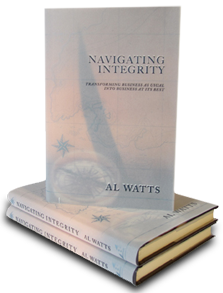I’ve been thinking about persistence a lot lately. It started in the middle of gathering firewood in the BWCA, sawing a downed log that was a tad large for my folding saw. I kept at it, and was eventually rewarded with enough wood to grill our freshly caught bass. Over dinner, conversation turned to Diana Nyad and her remarkable 53-hour non-stop swim from Cuba to Florida. Her successful swim that day was a crowning achievement following years of unsuccessful attempts; taken together they were a remarkable testament to persistence. Today I am celebrating Team Oracle’s recent win in the America’s Cup sailing race. The U. S. team trailed New Zealand’s 8-0, then in one of the most stunning come-backs in sports history, proceeded to win the next 9 races and retain the Cup. Persistence.
Persistence is admirable; it has fueled most of the victories, inventions, rags-to-riches journeys, entrepreneurial successes, scientific advances, cures and worthwhile developments in recorded history. However there is a potential dark side to persistence. Persistence in excess, or the wrong kind of persistence, could be merely stubbornness in disguise, just like too much courage or the wrong kind of courage could be just recklessness or adrenalin. When is persistence a good thing and when isn’t it? I think there are four main determinants:
Worthiness of a goal – It’s a pretty easy call when survival is at stake – lives or livelihoods. If I’m starving I will keep searching for food, or if I’m freezing in the wild I will keep trying to light a fire until physically unable to. Peace in northern Ireland remained a worthy yet illusive goal for decades, and persistent diplomacy eventually prevailed; peace in the Middle East is still illusive, but a worthy enough goal to pursue indefinitely. For the vast majority of us, worthy stakes likely have more to do with winning or retaining an important account, achieving important personal or professional goals, keeping important relationships intact or perhaps maintaining solvency to keep doors open and jobs secure. How many beyond ourselves will benefit from achievement of a goal is a factor assessing its worthiness. Whether we are still inspired by a goal, and our level of energy and passion to achieve it, are additional important variables.
Realism of a goal – Each year the marketplace is littered with thousands of failed ventures that fall victim to unrealistic goals or inaccurate assessments of capacities to achieve goals. To paraphrase Thomas Edison, vision without the capacity to execute the vision is mere hallucination. Some personality traits can play a role here. For example, excessive “Boldness” as measured by the Hogan Development Survey or inability to focus on details can contribute to underestimating a goal’s difficulty.
Goal vs method-driven – You are probably familiar with the old maxim about insanity: “doing the same thing over and over while expecting different results.” Key to Team Oracle’s victory in the America’s Cup race were rigging adjustments that they made after noticing how the New Zealand team consistently bested them upwind. They needed to set aside assumptions about what was and wasn’t possible, and adopted their competitor’s methods to win. When time after time something isn’t going as expected or desired, it likely signals a need to examine not only what we are doing and why we are doing it, but what methods we are employing and what adjustments to make.
Adverse impact – We know that a sign of chemical dependency and other addictions is when they begin adversely impacting important dimensions of our lives like family, friends, work or health. When we become so carried away by a pursuit that has similar adverse effects, it is likely time to question our persistence. We can persist proving that we are right, but in the process sever a relationship. We might prevail after years of building a business, meanwhile losing meaningful connections to family and friends. Mountain climbers who are “hell bent” to reach the summit, regardless of bad weather or other dangers, are said to suffer from “summit fever.” They often perish in the course of pursuing their goal to the end.
Leadership requires the capacity to see things as they are, not as we wish them to be. As Kenny Rodgers coached us in his song “The Gambler,” we need to know “when to hold them, when to fold them and when to walk away.” Persistence carries opportunity costs; persisting with one task often precludes devotion to others or exploration of options. If Bill Gates and Paul Allen had not walked away from their only modestly successful start-up Traf-O-Data, they would not have gone on to found today’s behemoth Microsoft. Had Akio Morita persisted with perfecting and marketing his early rice cooker, Sony would likely not have become the electronics powerhouse it is known as today.
We owe it to ourselves, our associates and significant others to exercise this kind of discernment around our persistence:
- Am I pursuing a worthwhile goal?
- Am I passionate about it and energetic enough to pursue it?
- Is my goal realistic?
- Am I overly fixated on one way of accomplishing my goal?
- Are the costs – to self, family, others – too high? Am I foregoing better opportunities?
And we should not trust only our own assessment, since we might be too consumed by our pursuits to be sufficiently objective. Ask friends, family, associates or coaches, and truly listen to what they say. If all systems are still “go,” then by all means persist away! As Bill Bradley, basketball Hall of Famer and three-term senator reminded us: “Ambition is the path to success. Persistence is the vehicle you will arrive in.”
“Success seems to be largely a matter of hanging on after others have let go.”
William Feather
“Never let your persistence and passion turn into stubbornness and ignorance.”
Anthony J. D’Angelo







Another great blogpost. “Persistance — Is It Always Good?” article was thoughtful, insightful, and practical. Especially liked that the article avoided the usual easy and simplistic adages; and boldfaced the dynamic tension between extremes of resoluteness/obstinacy and extremes of agility/fickleness. I was reminded of F. Scott Fitzgerald’s proposition: “The test of a first-rate intelligence is the ability to hold two opposed ideas in the mind at the same time, and still retain the ability to function.”
That situational awareness (of the middle or third way) — is a wise perspective — on the “persistant” challenges of life.
Excellent piece Al, as usual. I just posted it on some of the LinkedIn groups that I have joined. I think D’Angelo’s quote says it all: Never let your persistence and passion turn into stubbornness and ignorance. This happens too frequently though, where we get literally blinded by passion and conviction married with the need to be heard, to be right, to be successful, and to be proving ourselves. Even though we all know that there is very little in this world which is ‘always good’. Life is much about managing polarities and about knowing when to apply what, whereto, and how much. Persistence for the sake of persistence can be at least as harmful as faintheartedness if you ask me. Wishing you a meaningful, sensibly persistent week Al, Carolien
Thanks, Carolien. Gee, maybe we should send this and your comment to our stubborn Congress!